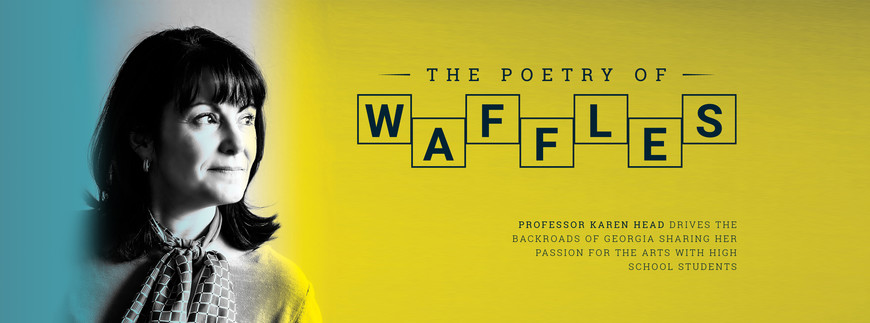
This story by Roger Slavens originally appeared in the Georgia Tech Alumni Magazine, and was edited for the College website by Zee Doehling and Rebecca Keane.
The friendly yellow Waffle House sign has been a source of comfort and artistic inspiration for Karen Head through the years. Recently, Head was appointed as the official Waffle House Poet Laureate — she even has the name tag to prove it. This fall, she’s fulfilling her new role by driving across the state of Georgia and sharing her passion for poetry and arts with high school students in far-flung counties, telling them about her own circuitous path to a meaningful career, and convincing them that they should go to college.
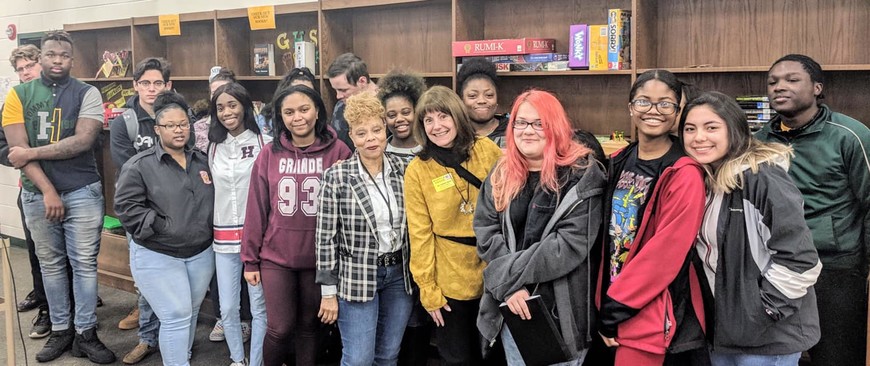
Georgia Tech professor Karen Head grew up loving Waffle House and poetry.
Whenever Karen Head would get homesick or just plain stuck while working on her doctoral dissertation at the University of Nebraska, she’d grab her keys, jump in her car and hit the open road. While her hometown of Atlanta was worlds away, she knew a place that would put her at ease—Waffle House.
The only problem was that she still had to drive a couple hours to get to the nearest location in Missouri, just north of Kansas City. “There’s virtually nothing between Lincoln and St. Joe’s, so they never built a Waffle House that far out into Nebraska,” Head says. “Back home in Atlanta and throughout the South, we have Waffle Houses everywhere.”
After Head reached her destination, she’d usually order a cheese and eggs plate, maybe a waffle, but always the hash browns. “For me, it’s all about the hash browns,” she says. “Scattered, smothered, covered, capped and diced. They make me happy. They make me feel like I’m home.”
By the time she finished her meal, she’d feel much better. She also might have worked out whatever dissertation problem had been bothering her. Or perhaps she had used the time between bites to jot down a quick poem, inspired by the sights, smells, tastes and emotions that consumed her in these familiar environs. “Even though it was a hassle to get there, the time and effort spent was well worth it,” Head says. “Waffle House always fixed me.”
She’d then hop back in her car and drive the return route to Lincoln and grad school—until the next time the need for the friendly yellow sign and those decadent hash browns hit her.
Becoming the Waffle House Poet Laureate
 Years later, well-entrenched in her role as a professor and resident poet at Georgia Tech, Head wound up telling the story so often that a well-connected colleague introduced her to two alumni who were truly moved by the tale: Waffle House CEO Walt Ehmer, IE 89, and Vice Chairman Emeritus Bert Thornton, IM 68. They were particularly floored when they found out that not only had Waffle House provided her comfort in times of need, but also their restaurant chain and its food had been the inspiration for a number of Head’s published poems.
Years later, well-entrenched in her role as a professor and resident poet at Georgia Tech, Head wound up telling the story so often that a well-connected colleague introduced her to two alumni who were truly moved by the tale: Waffle House CEO Walt Ehmer, IE 89, and Vice Chairman Emeritus Bert Thornton, IM 68. They were particularly floored when they found out that not only had Waffle House provided her comfort in times of need, but also their restaurant chain and its food had been the inspiration for a number of Head’s published poems.
“We were amazed that many of Karen’s poems were penned while she sat in a Waffle House booth,” Thornton says. “And we were humbled that our restaurants could serve both as her artistic refuge and, occasionally, her muse.”
Why has Head drawn so much inspiration from Waffle House?
“I just love the place,” she says. “I love the food—it’s just so solid and good. And you can always count on Waffle House to be there for you when you need it. It’s always open. The experience is always comforting and consistent. There’s not a lot of that in life today.”
After meeting at a couple of alumni events, Head and Thornton struck up a friendship, trading their books—both are published authors—and emailing each other about a range of topics, especially Georgia Tech. A common theme would often arise in their missives.
“I told Bert that I had become increasingly concerned that as Tech grew more competitive and more selective, we risked becoming too focused on recruiting top students who are good for the Institute’s reputation instead of recruiting students for whom Tech is good,” Head says.
Neither of them could know that what had begun as casual conversations would eventually lead to Thornton bestowing the title of Waffle House Poet Laureate to Head. Or that late summer 2019, funded by the company’s foundation, she would embark on a tour of Georgia high schools to share the virtues of poetry and arts with students across the state, and to make connections with some who might never have considered attending Tech, or for that matter, any college.

Connecting with students
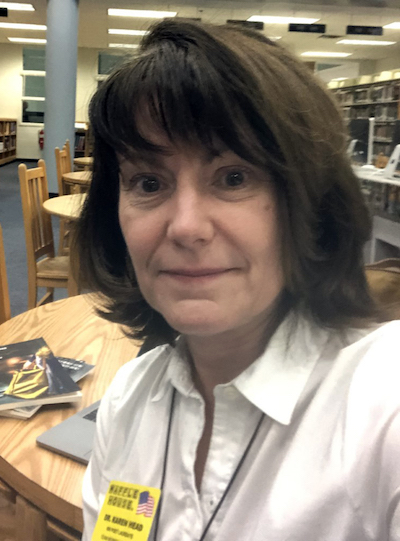 Head has so many roles and responsibilities at Georgia Tech that it’s hard to believe she has spare time to conduct a poetry tour. Or edit an international poetry journal—the acclaimed Atlanta Review, which just celebrated its 25th anniversary. Or write poems in the booths of Waffle House. But somehow she manages to fit all of these creative endeavors into an already crammed schedule.
Head has so many roles and responsibilities at Georgia Tech that it’s hard to believe she has spare time to conduct a poetry tour. Or edit an international poetry journal—the acclaimed Atlanta Review, which just celebrated its 25th anniversary. Or write poems in the booths of Waffle House. But somehow she manages to fit all of these creative endeavors into an already crammed schedule.
Her primary jobs on campus are twofold. She serves as the associate chair and an associate professor of the School of Literature, Media and Communication (LMC) in Georgia Tech's Ivan Allen College of Liberal Arts. “I teach creative writing, composition and technical writing, and when it comes to literature I kind of own the Jane Austen class we offer regularly in LMC,” Head says.
She also works as the executive director of Tech’s Naugle Communication Center, an LMC lab housed in Clough Commons to tutor students in all forms of communication: writing, public speaking and presentations, nonverbal body language and visual design.
“We work with everybody across campus, undergrads and grad students,” Head says. “And I personally coach the students, who serve as commencement and convocation speakers, and from time to time even help out faculty members with their presentation skills.”
Though Head is stepping off of Tech’s student publication board after serving on it for 14 years—starting out as the advisor to the literary journal Erato—she now finds herself leading the 2019–2020 Georgia Tech employee charitable campaign. “I’ve been one of the three co-chairs the last two years and now it’s my turn to be the point person,” she says.
With all the extra effort Head puts into helping her colleagues and students, it’s no surprise that the Georgia Tech Honors Committee named her the recipient of the Class of 1934 Outstanding Service Award this past academic year. And it’s precisely that spirit of service that prompted her to partner with Waffle House.

Relating to students who may be struggling to find their direction
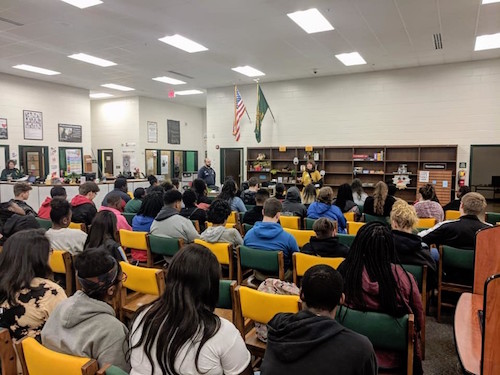
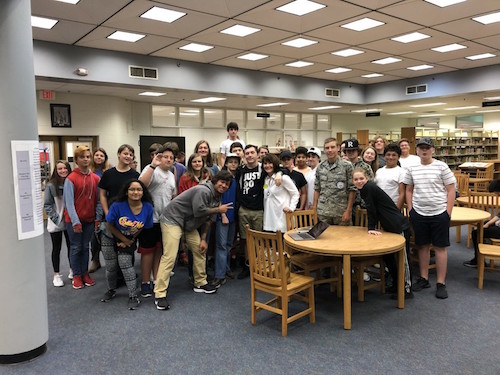
As the leader of the Naugle Communication Center, Head finds herself on the front lines with students who may be struggling with some of their coursework and need extra help. “I have a special vantage point on students who haven’t been as well prepared coming into Tech as others,” she says. “It’s not that our center is just for students who struggle—because most of those who come in are doing really well and want to do even better—but sometimes we are the best option for those who don’t know where to find assistance.”
Head admits that at one time in her life, she was one of those students who struggled—not with her schoolwork, but with making the right life choices. “Neither of my parents graduated from high school in the traditional manner, though they got their GEDs later on,” she says. “My dad was the youngest of 17 kids and his family strained to make ends meet. He went into the Army, and my parents married young. My mom followed him without ever finishing school, which was pretty common at the time, some 62-plus years ago.”
Despite moving around a lot during her father’s various posts, including overseas, Head in fact enjoyed a great education from Department of Defense schools. “Those were plum jobs and attracted the best teachers,” she says. “Many of them had PhDs.”
The real struggle came after Head graduated from high school. “A lot of women didn’t go to college—it wasn’t seen as an important thing,” she says. “I applied to two places and got into both, but the whole college thing frightened me, so I did what a lot of women my age did back then: I made a very bad decision and I got married.”
After getting out of what became an abusive relationship, she found herself 25, alone, and on the verge of a crisis. “My parents told me that I had to deal with the consequences of my actions on my own, and my friends who had gone to college had moved on and started their careers,” Head says. “So I got a corporate job and worked my way up to being the executive assistant for the company CEO. It was a good job, but I wasn’t happy. What I really wanted to be was a teacher.”
So Head started her life over as a 27-year-old freshman at DeKalb College, a two-year community college on Atlanta’s perimeter. Saying she did well once she finally enrolled is a vast understatement: Head wound up earning four degrees in rapid-fire succession over 11 years. She became a Regent Scholar at DeKalb, and then earned her bachelor’s degree at Oglethorpe University, master’s degree at the University of Tennessee and finally her PhD at Nebraska—all in English literature. Along the way, she became the teacher she wanted to be, as well as a published, acclaimed poet and author.
Looking back, she just wishes someone had put her on this path much earlier.

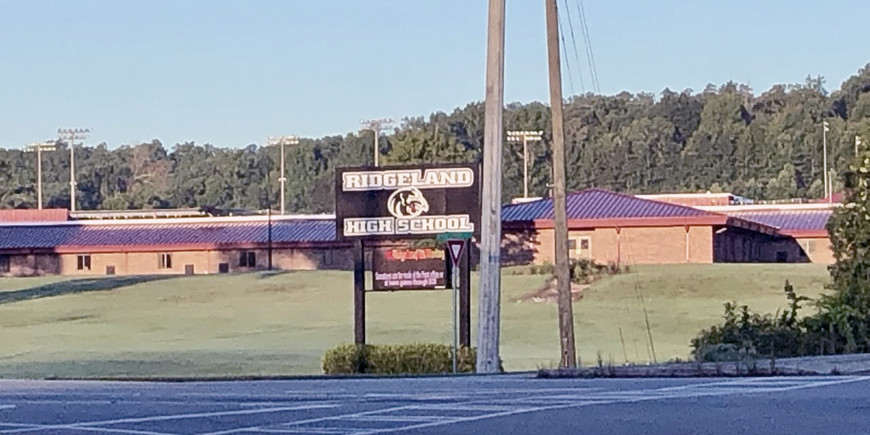
Helping more kids get to college
A couple years ago, Georgia Tech announced that it would give automatic admission to any valedictorian or salutatorian from a high school in the state of Georgia. Head thought this was a great idea.
But then she found out that there were dozens of counties that hadn’t sent the Institute a single applicant. “That really concerned me,” she says. “If you had guaranteed admission to arguably the best university in the state, what would keep you from applying? Maybe Tech isn’t the right place for some, but the truth is that far too many Georgia high school students don’t think they’re good enough for Tech. Or anywhere else, for that matter.”
Head shared some of these thoughts with Waffle House’s Thornton and how she thought that if she shared her personal story, she might get through to some of those who were just as unsure of themselves as she was when she was 18.
“I told Bert that as a tenured faculty member at one of the world’s leading institutions, I had a responsibility to visit some of these counties and try to convince their students at least to consider going to college,” she says.
At the same time, she had another agenda. “I am deeply concerned about the gutting of arts education and opportunities in the state of Georgia, and the rural counties are the ones who have been hit the hardest,” Head says. “Many schools don’t have dedicated arts teachers. But exposure to the arts has been proven to be one of the best things to develop critical thinking skills and helps you in other subjects, like math.”
In addition, she wanted to take some of the burden off these teachers who are all overworked and underpaid. “They’re doing the best they can with the resources they have, bless them,” Head says. “And I was willing to come out and help them for free.”
She and Thornton batted the idea around a bit, and finally Head asked him if Waffle House would consider sponsoring such a tour. “My thinking was that there might not be a college that’s close to them, but I knew that there were Waffle Houses nearby and that could be the connection,” she says. “I didn’t want to be paid—just my modest travel expenses covered. And I suggested that we could have a poetry competition and Waffle House could fund a small scholarship for the winner to use wherever they liked to go.”
Thornton loved the idea, and Head’s poetry tour, aimed at reaching at least 12 different counties, was fully funded. Head had asked for $5,500, and more than half of that was earmarked for the scholarship. Some while later, Head received an unexpected and lumpy envelope in the mail with a Waffle House return address on it. Inside was a name tag that had her named on it—Dr. Karen Head—and identified her as the official Waffle House Poet Laureate. It was one of the happiest moments in her career.

The power of poetry
Head started writing poetry when she was 6 years old and a first grader living in Fayetteville, North Carolina. “The local paper had a children’s section and ran kids’ poems, so every week I’d write one, give it to my mom and have her send it in,” she says. “Every Sunday, I’d open the paper looking for a poem of mine. This went on for weeks and weeks until finally, one day, they finally ran one. It wasn’t until I was much older and in grad school that my mother admitted that the one that got published was the first one she had actually sent in. It might sound horrible, but she inadvertently taught me an important lesson—to be a writer you have to be resilient and you can’t let rejection get to you. You can’t take it personally and you have to keep trying. Though it wasn’t my mom’s intention, I think the universe was working through her.”
Despite all that’s on her plate at work, Head still finds time to write poetry every day. “For me, it’s kind of like breathing,” she says. “I can’t imagine not doing it or not being able to do it.”
She’s had five books of her poetry published, including her latest, titled Lost on Purpose. It’s true that she’s written some of her poems while relaxing at a Waffle House. It’s also true that Waffle House and those hash browns occasionally weave their way into her poems. “Always Open,” for instance, takes her grad school story of driving two hours to get to the nearest location and merges it with the news of the untimely death of TV gourmand Anthony Bourdain that shook the foodie world in 2018.
“I wrote ‘Always Open’ after he died,” Head says. “He actually has an episode of his show, No Reservations, which featured Waffle House, and I connected the two things in the poem.”

"There’s a lot of teen angst, which is the perfect catalyst for poetry."
The pilot run of Head’s poetry-and-higher-education outreach program, fueled by Waffle House, took place this spring. “The hardest thing was to convince the schools that this was a real thing,” she says.
Her first visit was to Griffin High School. “It’s technically in a rural county, but it’s also the closest school to Georgia Tech that we had identified. We had a great day—more than 90 students showed up at the school library. It was World Read Aloud Day, which was a perfect coincidence.”
Head arrived at the school, introduced herself and then told the students her personal story and obstacle-laden route to college. Then she asked them an important, leading question: “How many of you know somebody who thinks college isn’t right for them?” Not surprisingly, everyone’s hands shot right up. “I’m sure that some of them meant themselves,” she says.
Then she spent a lot of time fielding questions about what college is like, what being a professor entails. “They were really trying to figure out how college works and what is expected of students. And then we talked a bit about poetry and about art, and I shared some of my poems with them.”
The poetry session went over well with the students. “I think everybody goes through a poetry phase, and it often happens around the time you’re in high school,” Head says. “That’s when they’re usually exposed to poetry and asked to read and write poems. There’s also a lot of teen angst, which is the perfect catalyst for poetry, being able to write down all your complex thoughts and feelings.”
At another trial run at Washington County High School in Sandersville, the discussion about poetry turned into an open mic opportunity for the students. A couple of them wanted to read their verse to Head and their classmates. “I ceded the floor to them and let them go for it,” she says. “One young woman got up and did a slam poetry piece—she was amazing and the students really got into it.”
Believe it or not, poetry is thriving in this country, especially among young people, Head says. “I think a lot of people underestimate that, especially when you consider spoken word events and slam poetry competitions,” she says. “They’re such close cousins to things like rap and other forms of music that they just naturally embrace it.”

A meaningful mission
Head admits that what she did in her two trial runs of outreach—and what she started in her larger, formal tour this fall—is not rocket science. (“That’s not just an idiom—we really do teach rocket science at Georgia Tech, after all,” she quips.)
“Maybe I’m just this crazy poetry lady, but I truly feel that if I can convince just one student who wasn’t thinking about going to college to change their mind and apply, all my effort to put this project together would be worth it,” she says. “If I could alter their course and put them on a better path, I’d be satisfied.”
Poetry workshops and school outreach sessions are old hat for Head, who has been putting them on for decades, dating back to her graduate study days at the University of Tennessee and University of Nebraska. “But it’s so much more meaningful to do this here in Georgia, because I know these places and the people so well,” she says. “I cling tightly to them, because I think it’s important that you never lose track of where you come from.”
Follow Dr. Head's Waffle House Poet Laureate adventures on Twitter
